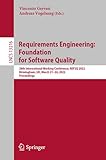Requirements Engineering: Foundation for Software Quality [electronic resource] : 28th International Working Conference, REFSQ 2022, Birmingham, UK, March 21-24, 2022, Proceedings / edited by Vincenzo Gervasi, Andreas Vogelsang.
Contributor(s): Gervasi, Vincenzo [editor.] | Vogelsang, Andreas [editor.]
| Vogelsang, Andreas [editor.] | SpringerLink (Online service)
| SpringerLink (Online service) .
.
Material type:  BookSeries: Lecture Notes in Computer Science: 13216Publisher: Cham : Springer International Publishing : Imprint: Springer, 2022Edition: 1st ed. 2022.Description: XVII, 259 p. 51 illus., 36 illus. in color. online resource.Content type: text Media type: computer Carrier type: online resourceISBN: 9783030984649.Subject(s): Software engineering
BookSeries: Lecture Notes in Computer Science: 13216Publisher: Cham : Springer International Publishing : Imprint: Springer, 2022Edition: 1st ed. 2022.Description: XVII, 259 p. 51 illus., 36 illus. in color. online resource.Content type: text Media type: computer Carrier type: online resourceISBN: 9783030984649.Subject(s): Software engineeringArtificial Intelligence and Explainability -- Transparency and Explainability of AI Systems: Ethical Guidelines in Practice -- Requirements Engineering for Artificial Intelligence: What is a Requirements Specification for an Artificial Intelligence -- Quo Vadis, Explainability? - A Research Roadmap for Explainability Engineering -- Machine Learning -- How Effective Is Automated Trace Link Recovery in Model-Driven Development -- A Zero-Shot Learning Approach to Classifying Requirements: Preliminary Study -- Natural Language Processing -- Abbreviation-Expansion Pair Detection for Glossary Term Extraction -- Towards Explainable Formal Methods: from LTL to Natural Language with Neural Machine Translation -- Req2Spec: Transforming Software Requirements into Formal Specifications using Natural Language Processing -- FRETting About Requirements -- User Stories -- Invest in Splitting: User Story Splitting within the Software Industry -- Guided Derivation of Conceptual Models from User Stories: A Controlled Experiment -- From User Stories to Data Flow Diagram for Privacy Awareness -- Business, Markets, and Industrial Practice -- Requirements Engineering in the Market Dialogue Phase of Public Procurement: A Case Study of an Innovation Partnership for Medical Technology -- A Business Model Construction Kit for Platform Business Models - Research Preview -- On Testing Security Requirements in Industry? -- A Survey Study -- Setting AI in context: A case study on defining the context and operational design domain for automated driving -- Cognition and Expression -- Requirements Engineering for Software-Enabled Art: Challenges and Guidelines -- A Study on the Mental Models of Users Concerning Existing Software -- Vision Video Making with Novices: A Research Preview.
This book constitutes the refereed proceedings of the 28th International Working Conference on Requirements Engineering: Foundation for Software Quality, REFSQ 2022, which was held in Aston, Birmingham, UK, during March 21-24, 2022. The 12 full and 7 short papers presented in this volume were carefully reviewed and selected from 45 submissions. They were organized in topical sections as follows: Artificial intelligence and explainability; machine learning; natural language processing; user stories; business, markets, and industrial practice; and cognition and expression. The special theme for REFSQ 2022 was "Explainability in Requirements Engineering". .


There are no comments for this item.